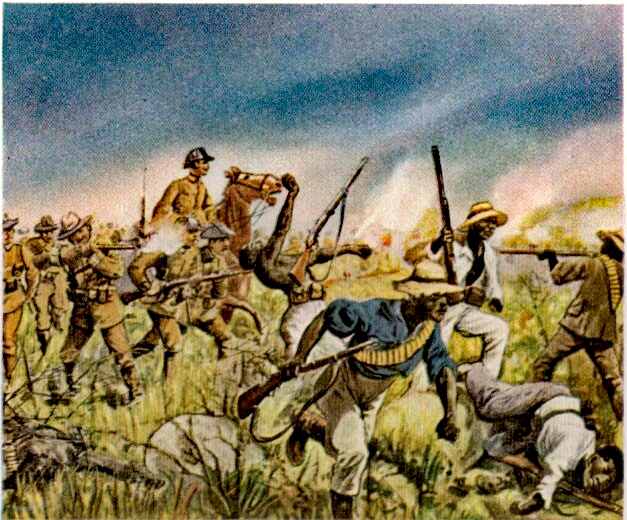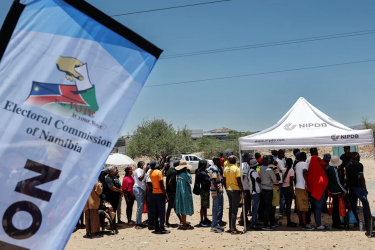Namibia
Namibia 25 years on: What happened to our dreams?
By Henning Melber
Reminiscences of Nelson Mandela and the US anti-apartheid movement
Ike Nahem at the memorial for Soweto martyrs.

German troops kill the Herero, circa 1904. Painting by Richard Knötel (1857-1914).
Africa's Pambazuka News has devoted an entire issue to Germany's 1904-08 genocide of the Nama and Herero peoples (in Namibia). Below Links International Journal of Socialist Renewal posts the editorial and an article that details this shameful imperialist slaughter and modern Germany's refusal to adequately acknowledge and compensate Namibia for its crimes. Read the full issue HERE. Become a Friend of Pambazuka.]
* * *
By Eric Van Grasdorff, Nicolai Röschert and Firoze Manji
March 20, 2012 -- Pambazuka News -- On March 22, 2012, Germany's parliament will debate a motion to acknowledge its brutal 1904-08 genocide of the Nama and Herero peoples. Germany’s refusal thus far, and its less than even ‘diplomatic’ treatment in 2011 of the Namibian delegation at the first-ever return of the mortal remains of genocide victims, demands a reassessment of suppressed colonial histories and racism.
Namibia: A trust betrayed – again?
[The following article first appeared in AfricaFile's At Issue Ezine, vol.
The legacy of anti-colonial struggles in Southern Africa: Liberation movements as governments

SWAPO's Sam Nujoma.
By Henning Melber
Southern Africa: The liberation struggle continues

[The following is the editorial in the latest edition of AfricaFile's At Issue Ezine, vol. 12 (May-October 2010), which examines the development of the southern African liberation movement-led countries. It has been posted at Links International Journal of Socialist Renewal with permission.]
By John S. Saul
Namibia: Reflections on 20 years after independence

By Jade McClune, Windhoek
March 23, 2010 -- Twenty years ago, at Namibia's first independence celebrations on March 21, 1990, many people would have shared the hopes and the euphoria of the moment. People thought that something good would come to us if we kept our peace and relinquished all the power to "the few who knew". Now that terrible hangover is wearing off and time has enforced a certain sobriety on us: the brutish reality of a rapidly falling life expectancy, unprecedented epidemic crises, poverty, vast malnutrition, a ruined education system and chronic mass unemployment, is inescapable.
Yes, there have been achievements: for some people with connections or capital or a lot of luck, life has improved as they moved into the other side of town, but for most citizens life has become meaner and shorter. There is a breakdown of all social and municipal services and a growing chauvinistic brutishness about the bureaucracy. At the same time we are witnessing a new desperate scramble for Africa's mineral wealth, that will make the evils of 19th century colonialism look pleasant in comparison. So let it be said, the struggle is not over.
Cuito Cuanavale: How Cuba fought for Africa’s freedom
By Barry Healy
The left and UN military intervention in East Timor
By Terry Townsend


